African American Customers, 1855 Through the Early 1900s
Between 1855 and the 1920s, thousands of African Americans in the Pittsburgh region opened savings accounts with Dollar Bank. They were laborers, ministers, teachers, soldiers, housewives, small business owners, and pioneering professionals.
As families put down roots, their relationship with Dollar Bank sometimes spanned generations. A number of family names carry across decades of Dollar Bank's records, just as they carry across decades of Pittsburgh history. Woodson. Proctor. Golden. Crunkleton. Googins. Gibson. Burley.
The names in Dollar Bank's ledgers reveal an early African American community strong with churches, social and literary clubs, sports teams, businesses and mutual aid societies.
These pages contain just a few of their stories.
Firsts
From Dollar Bank's founding in July 1855, the bank made no restrictions on who could open a savings account. All were welcome. African Americans were among Dollar Bank's earliest customers.First Savings Account
Born in Richmond, Virginia in 1812, Alfred A. Gibson became Dollar Bank's first African American depositor when he opened his savings account on November 13, 1855. He listed his occupation as a porter on a boat. In 1860, Gibson opened a second savings account at Dollar Bank. By that time, he was a porter at the Monongahela House, one of the most celebrated hotels in Pittsburgh.
Gibson, his wife Maria, and their four children lived in the Hill District. Oldest son Alfred A. Gibson, Jr., a barber, opened a savings account with Dollar Bank in 1872. The extended family resided at 73 Wylie Avenue, a property they owned by the early 1870s.
Alfred A. Gibson, Sr. was one of thirty founding members of the Colored United Brethren of Mutual Relief, a mutual aid society founded in 1843 in the Hill District.
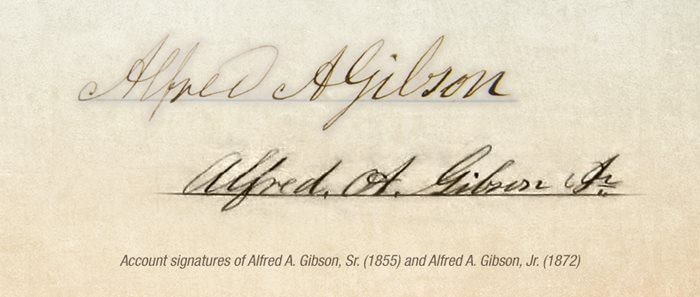
First Mortgage
Dollar Bank's first mortgage to an African American was issued in February 1860 to John L. Woodson, a barber. He was the oldest son of Dollar Bank depositors Lewis and Caroline Woodson.
John L. Woodson paid off his $850 mortgage in 1863. He and his wife, Julia Brannon Woodson, raised their three children in their home on the South Side.
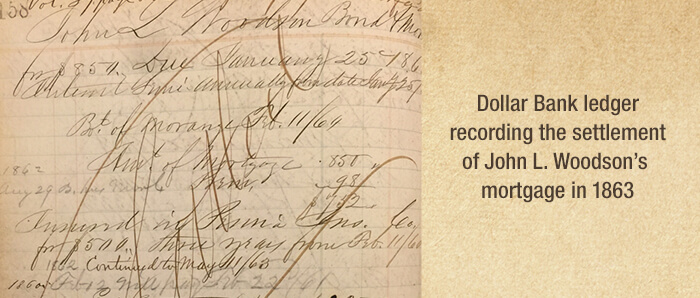
Read more about the Woodson Family.
Origins in the Virginia Region
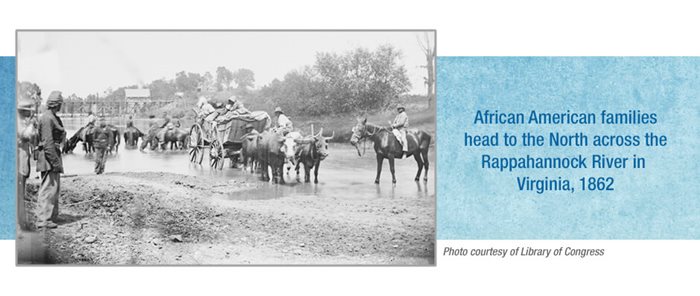
During the Civil War, many African American slaves in the battle-torn Virginia region took liberation into their own hands by fleeing towards the lines of Union troops and Northern states. Freedmen and women joined them on the trek north.
The migration swelled the African American population in cities like Pittsburgh, which was already growing with industrial expansion and workers seeking jobs.
Between 1855 and the early 1900s, about 40% of Dollar Bank's African American customers were born in Virginia. Another 10% hailed from Maryland, and 4% from Washington, D.C.
In the early years, fewer than 8% of Dollar Bank's African American depositors were born in Pittsburgh. As families put down roots, this percentage grew over time.
Juneteenth: Journeys Towards Financial Freedom

Several of Dollar Bank’s African American customers in the 1860s and 1870s were emancipated former slaves. Sometimes they identified themselves as such in the biographical information they gave to the bank clerk when they opened their savings accounts. In other instances, contemporary biographies reveal this information.
Rev. Jesse Cowles
Jesse Sumner Cowles was born in Virginia in 1848. When the Battle of Williamsburg came to James County in the fall of 1862, Cowles escaped from bondage and made his way to Union lines. Soldiers from the North sent him to safety and school in Connecticut. One year later, at age 15, Cowles enlisted in the 29th Connecticut Regiment, United States Colored Troops. Cowles saw combat with his regiment and was honorably discharged after his service. He became an ordained minister in the AME Zion Church.Rev. Cowles and his wife, Nannie, opened individual savings accounts at Dollar Bank on the same day in 1876.
Benjamin W. Thomas
Benjamin W. Thomas was born to a slave family in Bennettsville, South Carolina in 1845. When the Civil War broke out, he worked as a valet to his master, a captain in the Confederate army. At Antietam, Thomas escaped and slipped behind Union lines. One month later, he left the battlefront and headed north, settling in Pittsburgh. Thomas worked as a waiter and porter before he joined the Fisk Jubilee Singers in 1874.Benjamin Thomas opened savings accounts at Dollar Bank in 1872 and 1881.
Josephine & Thomas Gatewood
Josephine and Thomas Gatewood were slaves in Virginia. She was born Josephine Gray in Harrisonburg, while Thomas Gatewood was a slave of the Pennybacker family. The couple married in 1858. Some contemporary sources say Thomas Gatewood purchased their freedom, while other sources say the Gatewoods escaped their bondage during the Civil War. They arrived in Pittsburgh in September 1864.Thomas Gatewood worked as a waiter, a male nurse, and messenger for the City of Pittsburgh. He also managed the Centennial Jubilee Singers, whose musical director was Benjamin W. Thomas. Josephine Gatewood was active in missionary work and served in management of the Home for Aged and Infirm Colored Women. The Gatewoods were members of Bethel AME Church and were married for 52 years.
The Gatewoods opened savings accounts at Dollar Bank in 1865 and 1901.
Rev. George Brown Howard
George Brown Howard was born into slavery in Albemarle County, Virginia, around 1855. His parents were Warner Howard and Charlotte Gamble. The Howard family remained in Virginia during the Civil War, settling in Charlottesville after the conflict. George Brown Howard helped his father with farm labor. In 1872, he enrolled at the Hampton Normal and Agricultural Institute. Among his classmates was Booker T. Washington.Howard attended Storer College and Richmond Theological Seminary, becoming a Baptist minister. He served as pastor of Ebenezer Baptist Church in Pittsburgh and opened a savings account at Dollar Bank in 1898. Read more about Rev. Howard.
Robert E. Kane
Robert E. Kane was born approximately in 1836 and was one of six slaves owned by Juliet White in Winchester, Virginia. Winchester was the site of numerous battles and the most contested city in the Confederacy during the Civil War. By the age of 30, Kane had gained his freedom and was living in Pittsburgh. He worked as a porter for McKennan Pharmacy, located at 85 Market Street.Kane opened a savings account with Dollar Bank in 1866.
Roy Wheeler
Born approximately in 1847, Royal “Roy” Wheeler spent his youth as one of nearly fifty slaves of Gustavus (Gusty) B. Wallace, a wealthy farmer living in Stafford County, Virginia. Wheeler resided at Crow’s Nest, a plantation along the Potomac Creek, before the property was burned to the ground by Union troops during the Civil War. After gaining his freedom, Wheeler became a farmer and lived in Squirrel Hill by the age of 21.Wheeler opened savings accounts with Dollar Bank in 1868 and 1898. In 1898, he was a gardener living on Rural Street in East Liberty.
Richard Parker
Born a slave in Virginia, Richard Parker was a 38-year-old carpenter when he opened a savings account at Dollar Bank in April 1864.
Soldiers
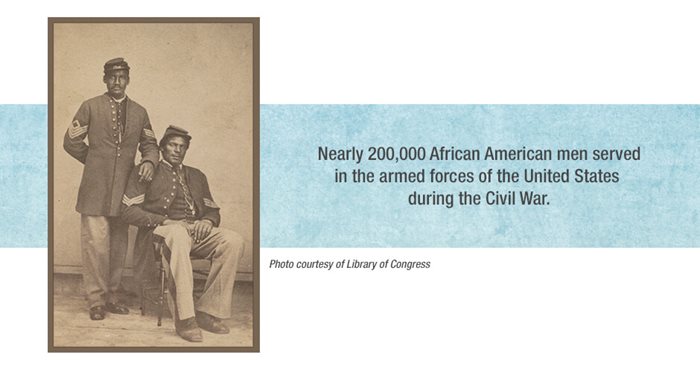
Clayton Ragan and William Chatman
Virginia natives Clayton Ragan and William Chatman were army buddies who had served together in the 22nd Infantry Regiment, U.S. Colored Troops, during the Civil War. After their discharge, they moved to Pittsburgh, where they both got jobs as waiters at the opulent St. Charles Hotel at the corner of Wood and Third Streets. They came to Dollar Bank the same day and opened savings accounts Nos. 13716 and 13717.
Vachel Catlin
Vachel Catlin was 49 years old and a soldier in March 1864 when he opened his account with Dollar Bank. A native Pennsylvanian and respected long-time resident of West Newton, Catlin ran a barbershop. He was the father of an even more famous soldier, Captain William Catlin, also a Civil War veteran and the first African American to earn a commission in the Pennsylvania National Guard.
William Temple
Born in King and Queen County, Virginia, William Temple was a farmer in Lower St. Clair Township when he joined the 45th United States Colored Infantry Regiment in June 1864. He opened his savings account on July 15, 1864, depositing his army pay. With his regiment, he saw battle at Fair Oaks & Darbytown Road, Virginia, and pursued Lee's army after the fall of Petersburg. William Temple was promoted to corporal on December 1, 1864. His regiment engaged in the last battle with Lee's Army of Northern Virginia at Appomattox Court House, on April 9, 1865, before General Lee's forces surrendered to the Union Army of the Potomac under Ulysses S. Grant that same day.
Daniel W. Downing
Dollar Bank depositor Daniel W. Downing was a Buffalo Soldier who served in Company E, 9th Cavalry Regiment, U.S. Army, in the late 1870s and early 1880s. He moved to Pittsburgh after his discharge from the army and served on the Pittsburgh police force in the early 1890s. A member of Pittsburg Patriarchie No. 39, a chapter of the Grand United Order of Odd Fellows, he played right guard on their football team. He started his savings account at Dollar Bank in 1892.
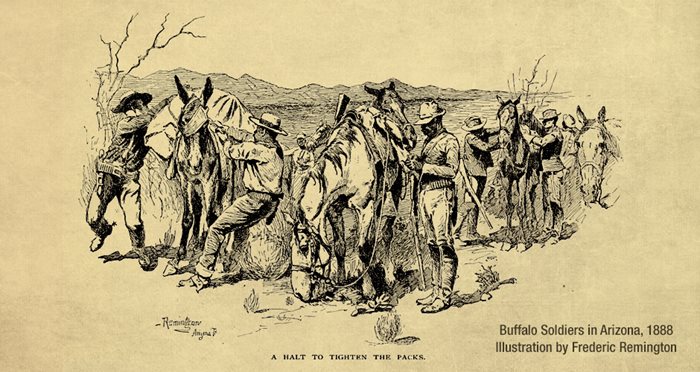
Pioneering Professionals
Owen A. Barrett
Owen A. Barrett was a Pittsburgh chemist who had a decades-long career working in drug stores. Barrett was trained in his profession by druggist B.A. Fahnestock, a fatherly figure who raised Barrett from childhood, according to African American physician and soldier Martin Delany, a contemporary of Barrett's. Barrett came up with the formula for a best-selling antiparasitic treatment that was sold under the label B.A. Fahnestock's Celebrated Vermifuge. Barrett opened his savings account with Dollar Bank in March 1857.
Rev. Jesse S. Cowles
When the Battle of Williamsburg came to James City County, Virginia in the fall of 1862, Jesse Sumner Cowles had not yet turned 14. Nevertheless, he made his way to Union lines, where soldiers from the North found him and sent him to Connecticut. After living there about a year, he enlisted in the 29th Connecticut Regiment, United States Colored Troops. He was wounded during the Battle of Darbytown and New Market Roads in October 1864. After a month in the hospital, during which he experienced a religious conversion, he was honorably discharged.
Cowles learned to read and write at an AME Zion school in Hartford, Connecticut. He went on to earn a degree from Wesleyan University and was ordained in 1872. He spent six years in Pittsburgh in the 1870s, serving at John Wesley AME Zion Church, established in the Hill District in 1836, and Avery Mission Church in Allegheny City (now North Side).
John Paul Golden, M.D.
Just one month before he opened his savings account at Dollar Bank in April 1888, John Paul Golden, M.D., became the first African American to graduate with a medical degree from Western Pennsylvania Medical College, forerunner of University of Pittsburgh School of Medicine.
Read more about Dr. Golden.
William E. Hance
William E. Hance (1873-1941) was publisher and president of the Pittsburgh Courier from 1924-1936. A successful businessman with blue-collar roots, Hance was part of the team of leaders who grew the Courier from a hometown start-up enterprise to one of the most widely read and influential African American newspapers in the United States. On politics, culture, advocacy and ground-breaking journalism, “America’s Best Weekly” made Pittsburgh voices heard across the nation.Read more about William E. Hance.
James E. Hughes
Pittsburgh police officer James E. Hughes opened his savings account at Dollar Bank in December 1907. Just four months later, he was wounded in the line of duty, shot in the chest while apprehending a thief in Squirrel Hill. An object in Hughes' vest pocket deflected the bullet and saved his life.
Hughes had a 24 year career on the City of Pittsburgh police force. He served as a patrolman for 14 years and made detective in 1919. His bravery was tested many times during his years of service. Unfortunately, just as he was being considered for promotion to lieutenant, Hughes was killed in the line of duty, shot by a trio of robbers in December 1929. More than a thousand people attended his memorial service at Ebenezer Baptist Church. His name is inscribed on the Allegheny County Law Enforcement Officers Memorial.
Samuel A. Neale
In 1856, music and mathematics teacher Samuel A. Neale, age 26, was appointed principal of School House No. 6, Allegheny City's school for African American children. He held this post for more than 20 years. Neale opened a savings account with Dollar Bank in 1866.
A resident of Sandusky Street, he dedicated himself to improving the lives of his students through education and culture. He was editor of two journals for African Americans, the Elevator and the Commoner, served as secretary of the Allegheny Teachers' Institute, and was known for organizing musical and literary festivals showcasing the talent from his school. Among the students he inspired was future physician John Paul Golden.
Jennie Margaret Proctor
A granddaughter of Lewis and Caroline Woodson, Jennie Margaret Proctor was the owner and proprietor of Proctor's Hair Shop, a ladies' beauty salon founded by her mother, Virginia Woodson Proctor, in 1867. For nearly 100 years, the business was run by successive generations of Woodson-Proctor women, and was the oldest ladies' hair salon in downtown Pittsburgh.
Understanding the customers' needs as women and mothers, Jennie Proctor started a doll hospital on the same premises as the hair shop, to engage and delight the children of her clients while their hair was being done. A figure of elegance and dignity, Proctor taught beauty classes for young black women at the Y. She was a member of Bethel AME Church and the Aurora Book Club, a supporter of both the Y.M.C.A. and Y.W.C.A., and was one of the first local secretaries of the NAACP.
Jennie Margaret Proctor opened her savings account with Dollar Bank in 1890 at the age of 16.
James T. Whitson, M.D.
A sharecropper's son, James T. Whitson was raised on a farm in Guilford Township, Franklin County, Pennsylvania, where his father, Thomas, worked the land for two elderly sisters, Ruth and Ann Beatty. Harassment by Confederate raiders during the Civil War induced Thomas to move his family to Pittsburgh. Educated in Catholic parochial schools, James T. Whitson became one of the first two African American students admitted to Pittsburgh Central High School. (The other was George G. Turfley, who also went on to become a physician.) After graduation, Whitson became a teacher. Around 1876, he took a position as principal of a school for African American students in Ripley, Ohio, a post he held for five years.
Whitson resigned as principal in order to start medical studies at Western Reserve Medical College in Cleveland. Working his way through college by barbering, he graduated in 1885. A devout Roman Catholic, in 1886 he helped Daniel A. Rudd launch the American Catholic Tribune, a weekly newspaper for black Catholics. In the late 1880s, Dr. Whitson returned to Pittsburgh, where he established a medical practice. He remained in the Pittsburgh region for the next five decades, practicing medicine in Brownsville, Uniontown and Monessen.
He opened his savings account at Dollar Bank in August 1888.
Waiters Who Became Doctors
The rapid industrialization of late-1800s Pittsburgh made the city a center for business travelers. As the number of restaurants and hotels downtown grew to accommodate the surge of visitors, many young African American men found jobs as waiters. For at least two Dollar Bank depositors, earning money as waiters was how they helped pay their way through college while studying to become physicians.James A. Wormley, M.D.
Born in 1867, James A. Wormley was the grandson of James T. Wormley, founder and proprietor of the Wormley Hotel, the first integrated hotel in Washington D.C. James A.'s father and uncle took over the hotel when James T. retired. Pursuing higher education was a family priority. James A. Wormley's uncle was a pharmacist and the first African American to graduate Howard University's school of pharmacy; two of James A.'s brothers were dentists.James A. Wormley attended Howard University, receiving a degree in pharmacy in 1889, and his medical degree in 1892. In August 1888, he opened a savings account with Dollar Bank and lived on Carpenter Alley, in what is now North Side, while working as a waiter. He married Emma Davis in 1896. The couple lived in Newark, New Jersey, where he practiced medicine for nearly a quarter century.
William E. Mackey, M.D.
William E. Mackey was born in the small town of Martinsburg, West Virginia, in 1866. His father died when he was a child. Educated in the common school in his town, he went on to study classics at Storer College. He then pursued a medical degree, first attending University of Michigan and then Howard University, from which he graduated in 1898. That same year he was appointed to the staff of Freedmen's Hospital in Washington, D.C. There he trained as a surgeon.In 1901, Dr. Mackey moved to Chicago, opening a practice on State Street. He was a popular and respected physician with his patients, who came from all races. In 1907, Dr. Mackey saved the life of his next-door neighbor, John Hart, by performing an on-site emergency operation.
Dr. Mackey became a Dollar Bank depositor in 1890.
Musicians
The musical traditions of Pittsburgh's African American community go back much farther than the heyday of jazz clubs on Wylie Avenue and the New Granada Theater. Two Dollar Bank depositors are among the many African American musicians and singers who were part of Pittsburgh's contributions to the world of music.Benjamin W. Thomas
Benjamin W. Thomas was an early member of the Fisk Jubilee Singers. He was born to a slave family in Bennettsville, South Carolina in 1845. When the Civil War broke out, he worked as a valet to his master, a captain in the Confederate army. At Antietam, Thomas escaped and slipped behind Union lines, where he hired himself out as an officer's servant for $7 a month. Wary of being captured by rebels looking for fugitive slaves, he decided to leave the battlefront and move to the North.
Settling in Pittsburgh, he found work as a waiter and porter while attending night school. He was a member of Bethel A.M.E. Church, where he sang in the choir. In 1874, he was recruited to join the Fisk Jubilee Singers. Formed in 1871 as a way to raise money for their struggling university, the Jubilee Singers quickly become an international sensation, introducing black American music to the world. Benjamin W. Thomas sang bass with the group.Thomas opened his savings account with Dollar Bank in 1881.
Joseph McCloud
Singer, musician, orchestra and jazz band leader Joseph McCloud was a musician with an astonishing repertoire. Bach and Mendelssohn, Stephen Foster, Scott Joplin, old English madrigals, Tin Pan Alley hits, jazz, jubilees -- McCloud played it all. Born in Front Royal, Virginia, his father Hartley was a laborer, and his mother, Martha, kept house. The family moved to Pittsburgh in 1888, when Joe McCloud was 14. In 1900, he married Anna Gertrude Carson, whose father, Paul Carson, was one of the first African Americans on the City of Pittsburgh police force. The newlyweds lived on Wylie Avenue.While working as a janitor for Dawson Brothers Piano Company, McCloud pursued his passion for music. He joined the string ensemble with the Northside Choral Club in 1907 as a viola player. A few years later, he formed a mandolin orchestra, and became a singer-musician in the highly popular Lindsay Quartet. With these groups, he played Kennywood, summer park concerts, lodges, churches, private parties, and vaudeville's Keith Circuit. His groups provided musical entertainment during intermissions between silent movies at the Pitt Theater downtown. In 1921, McCloud formed a jazz band, McCloud's Jazzers. He remained with the Lindsay Quartet, which made repeat performances on KQV radio in the late 1920s.
Joseph McCloud opened his account with Dollar Bank in 1901. His wife, Anna, opened a savings account in her name in 1913.